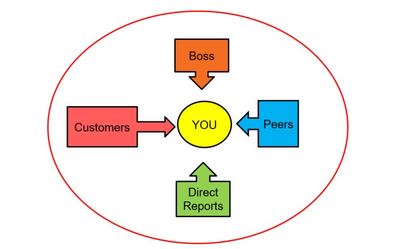 What is it? Feedback - that oft-stated, oft-misunderstood grail of organizational life - is simply information provided to a person about his/her behavior and the results of that behavior. 360 feedback is a unique type of feedback that is often used for leader development. Basically, the leader is asked a series of questions about his/her behaviors (e.g., setting a vision or encouraging teamwork) and the results of those behaviors (e.g., fostering trust and team performance). Then, people who know the leader well and have observed his/her behaviors answer the same set of questions. These raters typically consist of the leader’s boss, peers, and direct reports, as well as internal and external customers. It is this feedback from all sides that results in a 360 degree “view” of the leader’s actions. Why do we use it? The answer is very simple: Leader self ratings alone tend to be unreliable and sometimes inaccurate “scores” of a leader’s actual behaviors. This is not to say that leader self ratings are devoid of accuracy; to the contrary, in certain situations they can be quite accurate. Likewise, ratings supplied by other people should not be considered the absolute “true scores” of leader effectiveness. The point is that we need both the leader self rating and the ratings of others to get the most accurate view of the leader’s behaviors and effectiveness. How do we use it? The power of 360 feedback manifests in two main ways. First, by comparing his/her self scores to the scores of others, the leader can develop greater self-awareness. Sometimes, the leader can discover a hidden strength be realizing that others see something that the leader may have missed. For example, perhaps the leader does not see herself as engaging others at an individual level. However, her raters report a high level of individual consideration. As she reflects on some recent incidents, she realizes that she has done a pretty good job of relating on an individual basis. This realization gives her greater confidence in these situations. Second, by using benchmarking data, the leader can identify areas for improvement. In other words, the 360 data is best utilized when the leader sets specific goals for improvement. This is one area in which an experienced leadership coach can be helpful. An experienced coach can help the leader to craft clear goals, find resources to help meet those goals, and act as an accountability partner. Concerns about 360 feedback In our research and consulting, we see three common concerns with 360 feedback 1 - Leaders believe that it is a waste of time The answer to this concern is straightforward: it all depends on the leader. If the leader is motivated to learn and grow, he/she will find something useful in the 360 feedback. We have found this to be the case Every Single Time. 2 - Feedback will not be confidential This concern manifests in two forms. First, raters are concerned that their answers will not be confidential. We address this concern by assuring anonymity, with the following caveats: a) if the leader only invites one person to a particular category (e.g., peer), then the leader will likely know who you are [the exception to this scenario is the direct report category, in which at least two raters must participate in order for feedback to show]. Second, the leader is concerned that others will see his/her feedback. To counter this concern, we stress that the data belongs to the leader, and the leader decides who sees what. Even when we conduct a 360 in an organization, one of our rules of engagement is that senior management will only see data in aggregated form. 3 - Feedback will be used for evaluation instead of development We cannot stress this point enough: 360 feedback should only be used for developmental purposes. When used for evaluation, it is too easy for people to “game the system”. Our suggestion is to require participants to identify 2-3 goals based on their 360 feedback, and to have senior management hold them accountable for goal achievement. Have more questions about 360 feedback? Contact us and we will be glad to help
1 Comment
Leave a Reply. |
|
Copyright © 2023


 RSS Feed
RSS Feed
